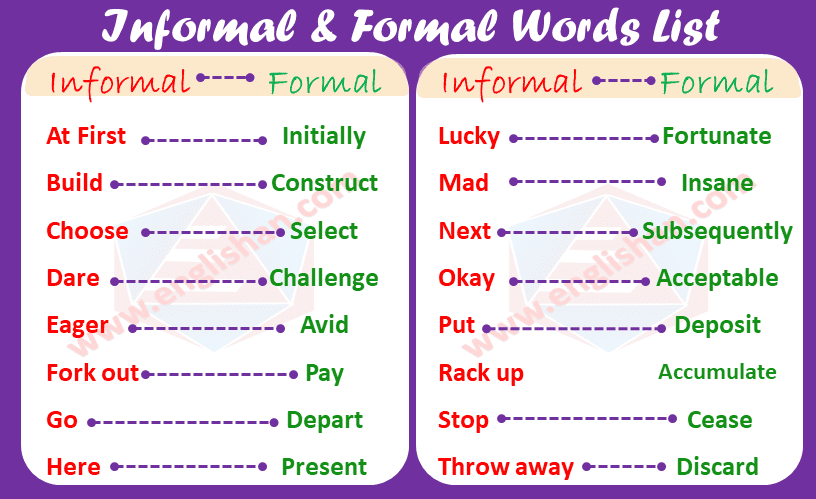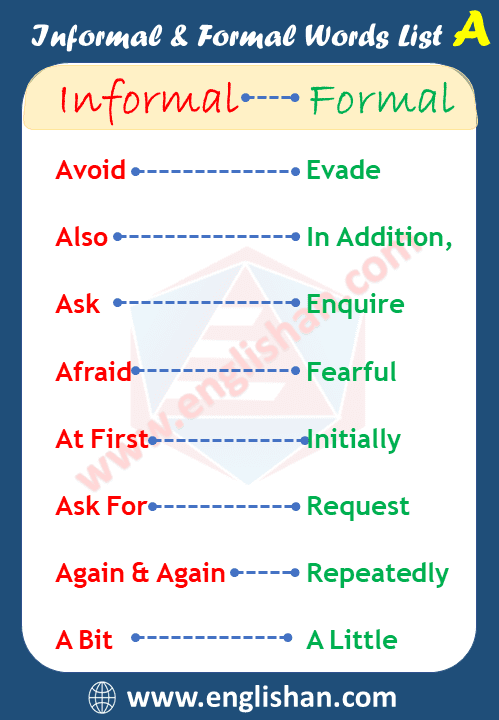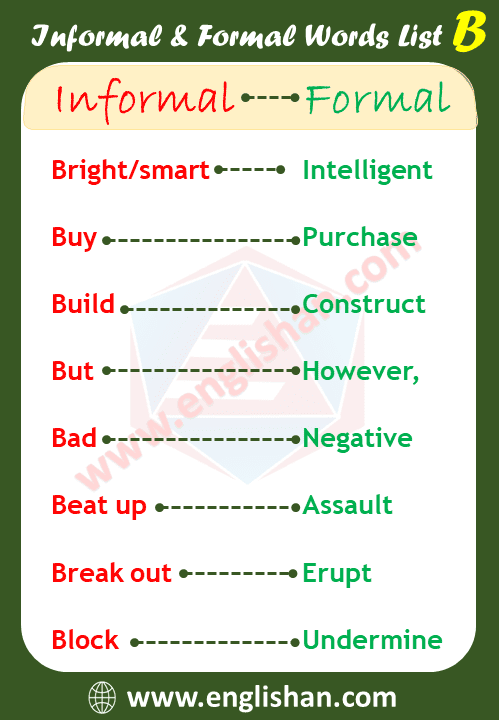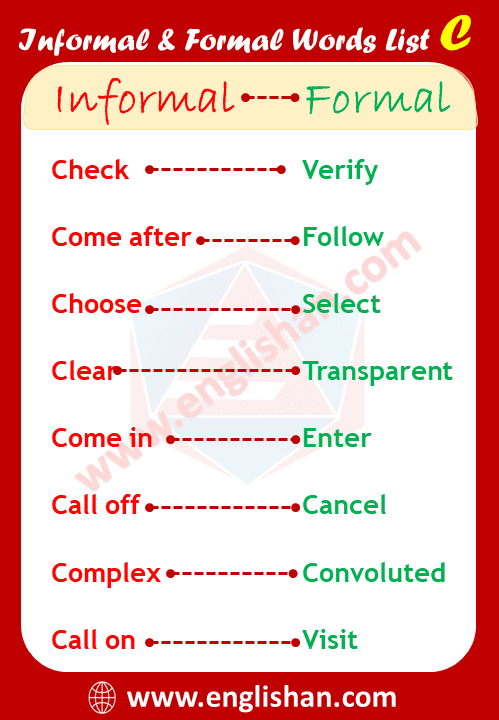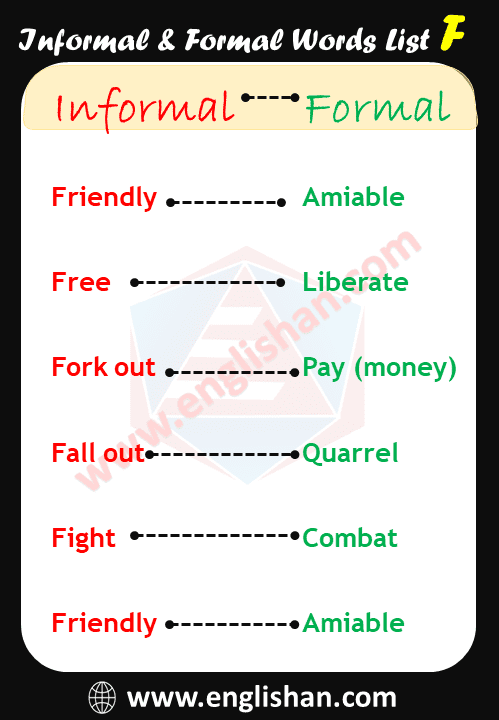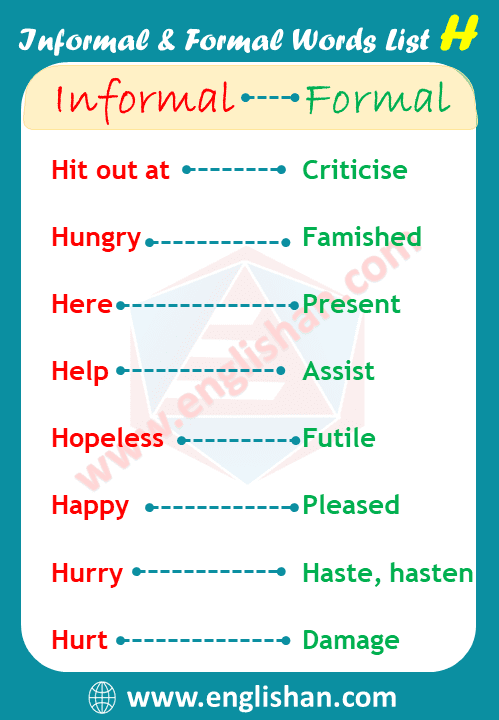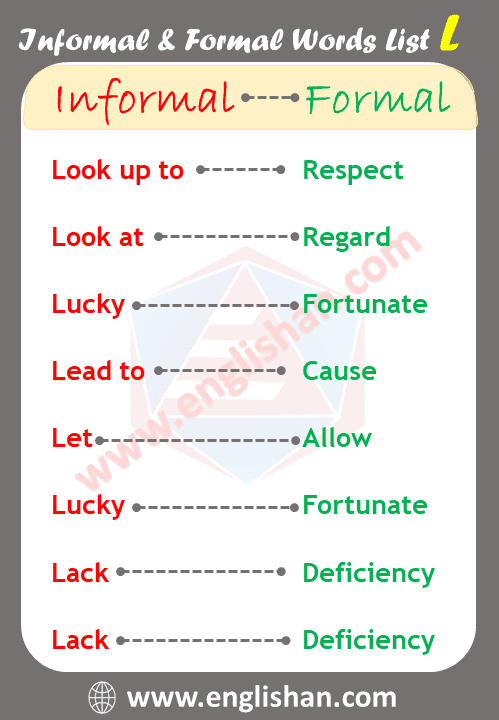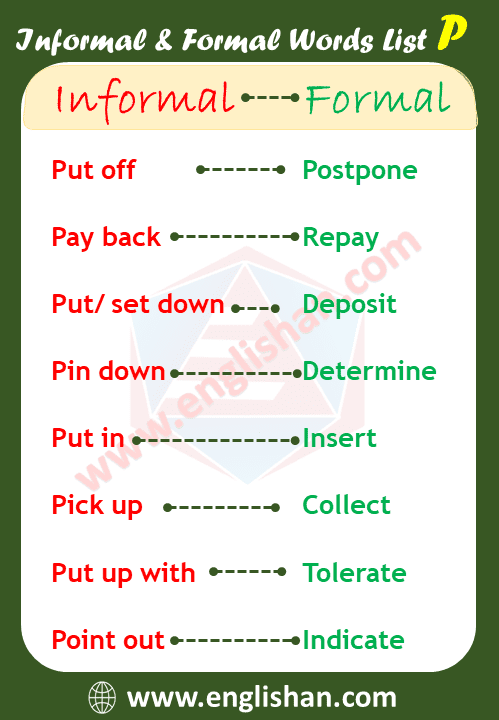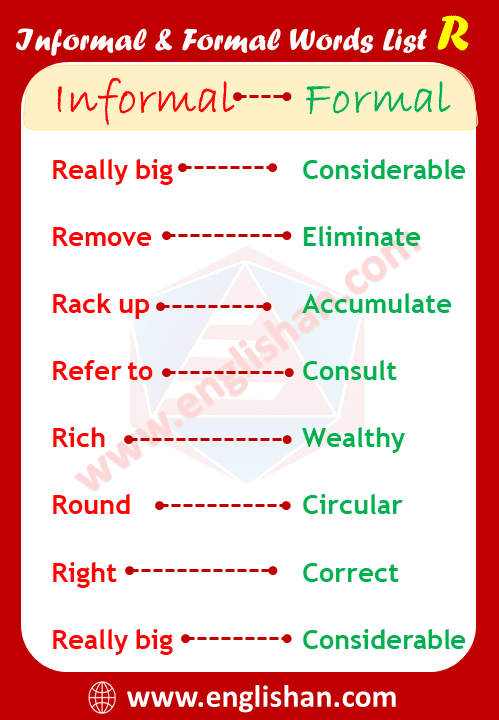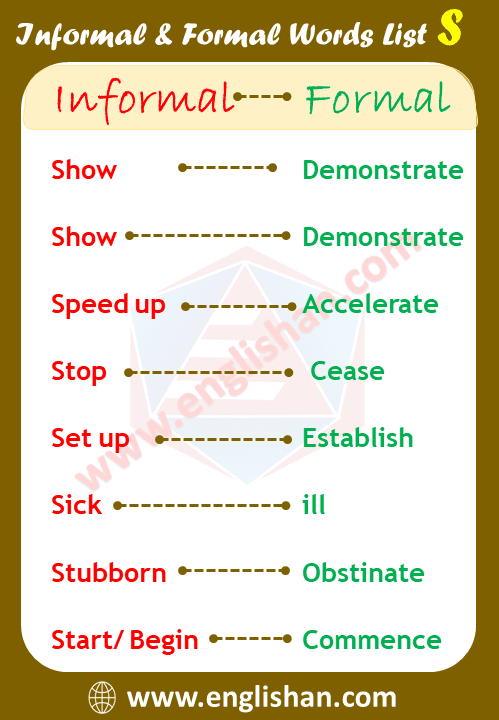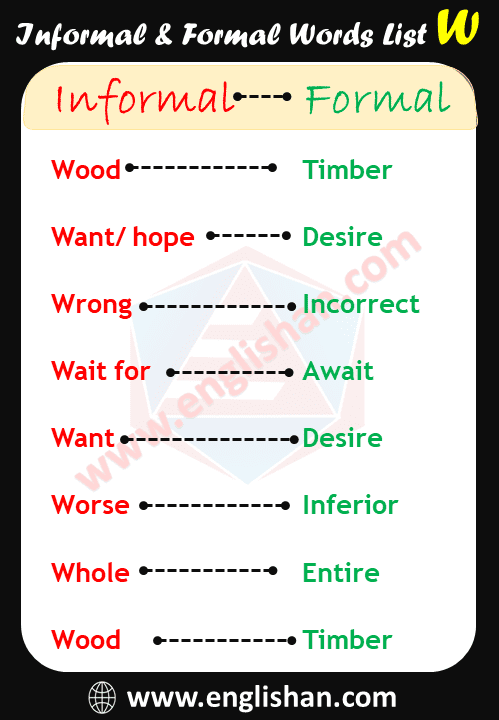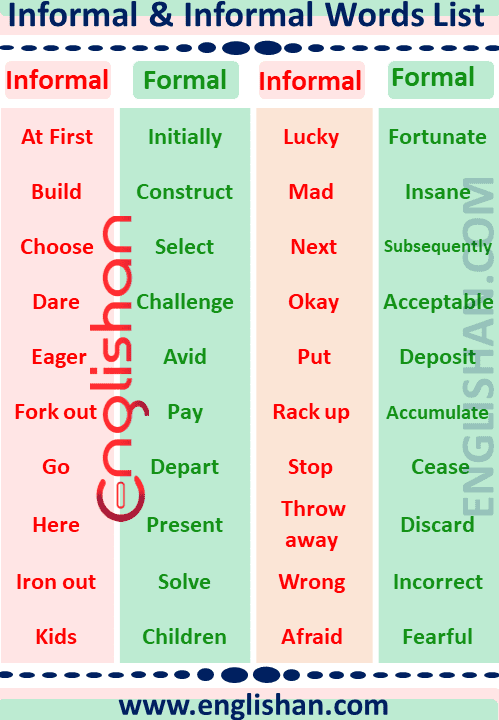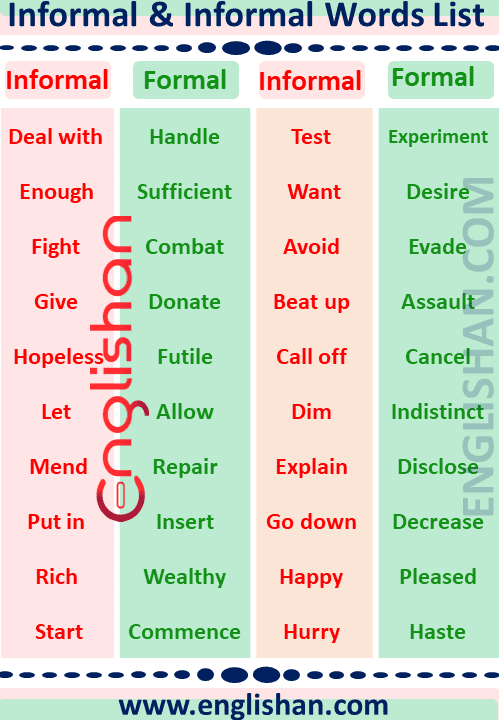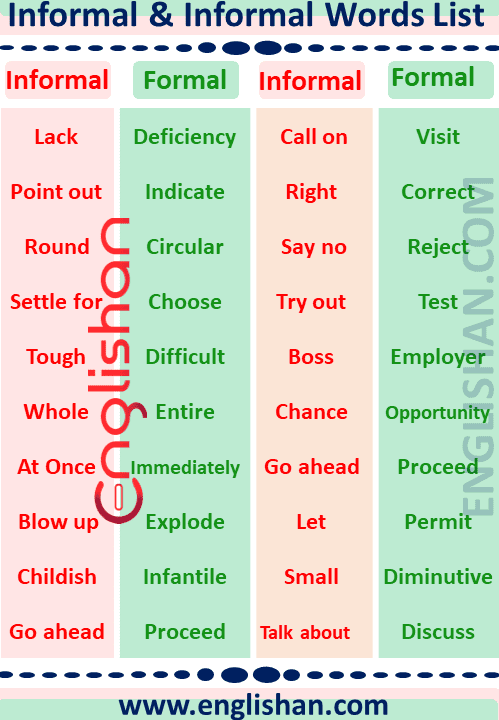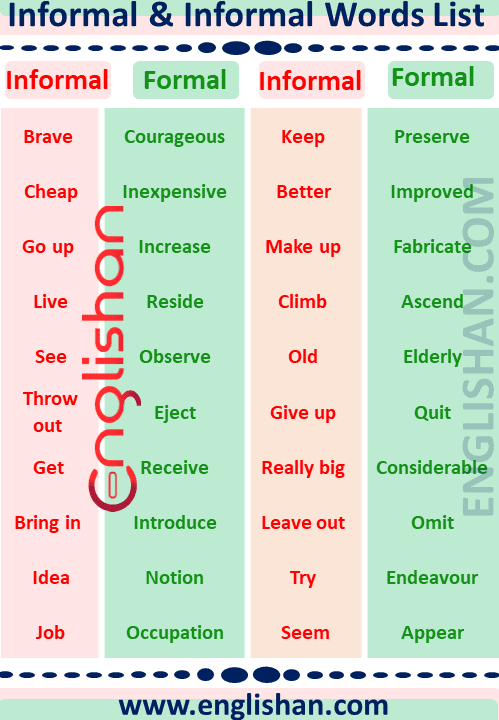
Formal English:
Formal Language is like a formal dress, in a formal language you have to be careful with words, you have to choose words with respect. We use it when writing essays for school, cover letters to apply for jobs, or emails and letters at work.
Informal English:
Informal Language is the language you speak in your friend’s circle. It is used in conversation with your family and friends, informal words are also respectful words, but they are less polite as compare to formal words.
Here are Formal and Informal words List in English
1. Verbs – Informal & Formal
| INFORMAL | FORMAL |
| a lot of | numerous |
| anyways | nevertheless |
| block | undermine |
| break down | fail/collapse |
| break up | disintegrate |
| bring in | introduce |
| can | is capable of |
| come back | return |
| come/go in | enter |
| deal with | handle |
| enjoyment | gratification |
| faithfulness | fidelity |
| find out | discover |
| from (company) | on the behalf of |
| get | obtain |
| get in touch with | contact |
| give in | yield |
| give the go-ahead | authorize |
| give/bring back | return |
| go against | oppose |
| go ahead | proceed |
| go away | leave/depart |
| go before | precede |
| go down | decrease |
| go out of | exit |
| go up | increase |
| hopeless | futile |
| house | residence |
| hungry | famished |
| it’s about | it concerns, it’s in regards to |
| keep | retain |
| keep up | maintain properly |
| lead to | cause |
| leave out | omit |
| let | permit |
| link up | connect |
| lively | energetic |
| look at | examine |
| look for | seek |
| look into | investigate |
| look like | resemble |
| lots of/ a lot of | much, many |
| make out | discern |
| makeup | fabricate |
| mend | repair |
| need to | required |
| plus/also | moreover/furthermore |
| point out | indicate |
| put in | insert |
| put off | postpone |
| put up | tolerate |
| put up with | tolerate |
| put/set down | deposit |
| rack up | accumulate |
| really big | considerable |
| refer to | consult |
| ring up | call |
| seem | appear |
| set out | display |
| set up | establish |
| settle for | choose |
| show | demonstrate, illustrate, portray |
| show up | arrive |
| speak to | address |
| stand for | represent |
| start | commence |
| take away | remove |
| take out | remove |
| talk about | discuss/consider |
| thanks | gratitude |
| think about | consider/ponder |
| think of | conceive |
| throw away | discard |
| throw out | eject |
| tired Formal and Informal words list in English Pdf | fatigued |
| tons of, heaps of | large quantities of, a number of |
| try out | test |
| wait for | await |
| whole | entire/complete |
| worse | inferior |
| say sorry | apologize, apologise |
2. Transitions – Informal & Formal
| Informal | Formal |
| Anyways | Nevertheless |
| Plus/Also | Moreover/ Furthermore |
| But | However |
| So | Therefore/Thus |
| Also | In addition, Additionally |
| ASAP | as soon as possible/at your earliest convenience |
| Okay, OK | acceptable |
| In the meantime | In the interim |
| I think | In my opinion, |
| In the end, | Finally |
| To sum up | In conclusion, |
| In a nutshell/Basically | To summarize, |
| Anyway, | Notwithstanding |
| All right | Acceptable |
| Well, | |
| To top it all off, | |
| On top of it all, | |
| In order to |
3. Emphasis Words – Informal & Formal
| Informal | Formal |
| lots of/ a lot of | much, many |
| tons of, heaps of | large quantities of, a number of |
| totally | completely, strongly |
| really, very | definitely |
4. Letter Expressions – Informal & Formal
| Informal | Formal |
| Hi Robert, | Dear Sir or Madam |
| Just wanted to let you know… | I am writing to inform you… |
| Love, | Yours sincerely, Yours faithfully, |
| Cheers, | |
| Yours Truly, Best regards, kind regards | |
| Hope to hear from you soon | I look forward to hearing from you |
| You can call me if you need anything | Please do not hesitate to contact me |
5. Abbreviations – Informal & Formal
| Informal | Formal |
| ASAP | as soon as possible |
| T.V. | television |
| photo | photograph |
| cell | cell phone |
| net | Internet |
6. Slang – Informal & Formal
| Informal | Formal |
| kids | children |
| bad | negative |
| good | positive |
| really big | considerable |
| right | correct |
| wrong | incorrect |
| smart | intelligent |
| cheap | inexpensive |
| loaded | rich |
Play Word coach Game: Click Here.
Download Word Coach Application
Read More:
Post Views: 71,880
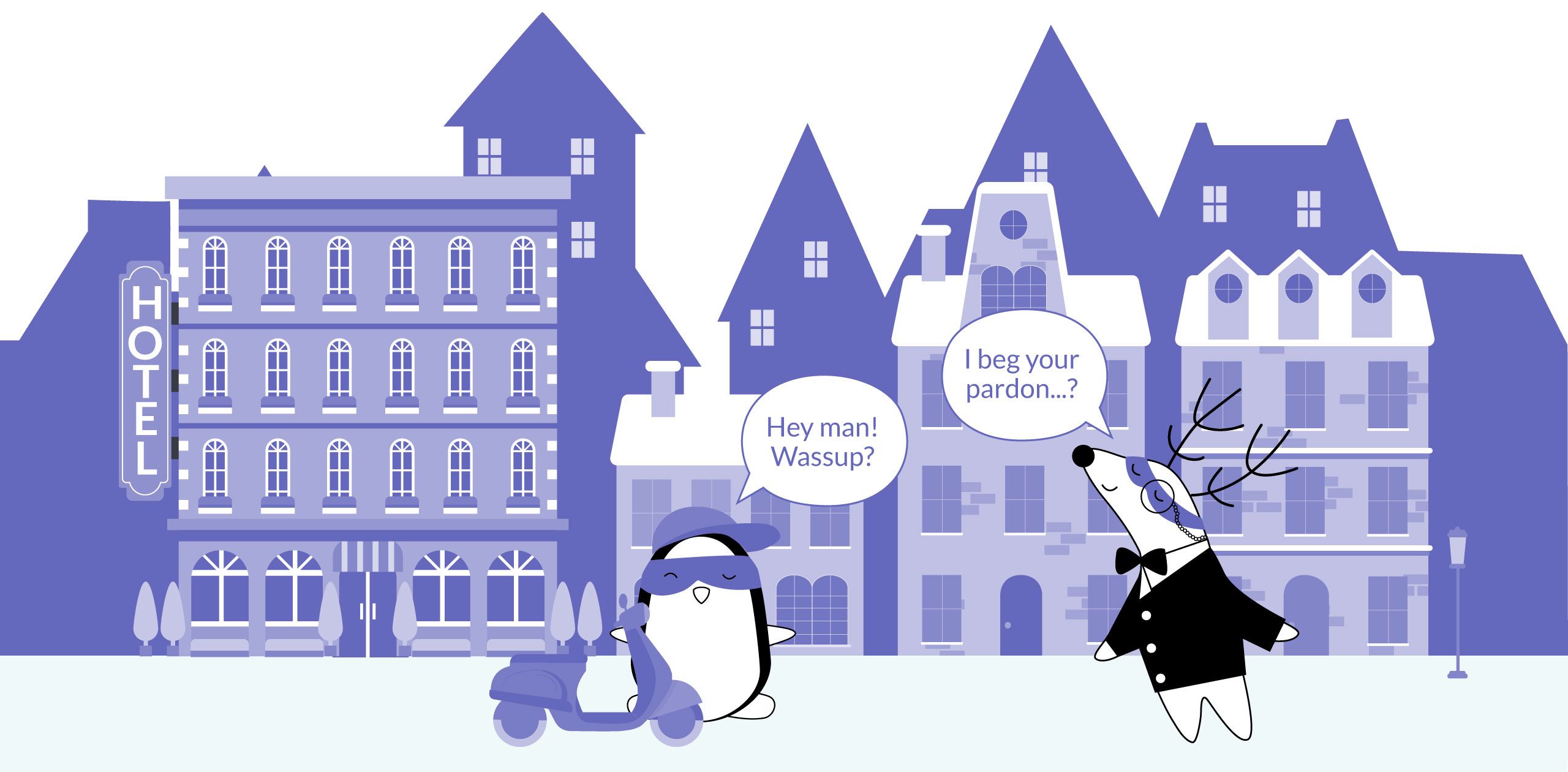
You have probably noticed that there are many things in English which you can separate into casual and formal: clothing, events, and even relationships. Conversations are no exception. Every English learner should master different communication styles with other people to be able to hold conversations of different levels of importance.
You need to keep proper expressions in mind to be able to use them depending on the situation. Sometimes, a simple phrase — just a few words — can turn the conversation in a completely different direction. Choosing the right words at the right time will allow you to show yourself as a professional at all times.
Below, you will find a step-by-step guide to maintaining a formal conversation in English, along with helpful tips. Let’s begin!
Learn English with Langster
How to Run a Formal Conversation
Formal Greetings
Any conversation begins with a greeting. Formal greetings in English are appropriate when you communicate with colleagues, business partners, as well as people you meet for the first time. When meeting new people, you need to find out the person’s name, give your name in response, and say that you are pleased to meet him.
Here is a set of phrases for a formal greeting:
- Hello! How have you been?
- Good morning/Good afternoon/Good evening!
- I am glad to see you. / I am happy to see you. / I am pleased to see you.
- Good to see you again. / Nice to see you again.
- My name is Sarah. It is a pleasure to meet you! What is your name?
Possible responses to the formal greeting:
- Fine, thanks, and you? / Fine, thanks, what about yourself?
- Very well, thanks. / Pretty good, thanks.
If you did not hear what the other person said, ask them to repeat using one of the phrases:
- Sorry?
- Pardon?
- Could you repeat, please?
Conversation Starters
After you have greeted the person, you need to continue the conversation. When talking to a friend, you are likely to quickly find a topic of conversation. However, if you have just met a person at an official event, it is necessary to establish contact between you and your new acquaintance.
We’ve already discussed the basic rules for running a small talk in the previous article. Although they refer to more casual chatting, they are also applicable to a given setting, so make sure to check them as well. At a formal event (contrasting small talk or everyday conversations), you can use the following phrases to start a formal English conversation:
- I’ve heard so much about you.
- How do you like the conference/workshop? / Is it your first time at the conference/workshop?
- So, you work in PR, right? / Have you always been in PR? / How long have you been working for this firm?
- I am from Greece. And you?
- How do you like it here? / How long have you been here?
- How are you? How are you doing? How are things? How have you been? How’s your day going so far? How’s it going?
- This is my first visit to London. What do you recommend visiting while I am here?
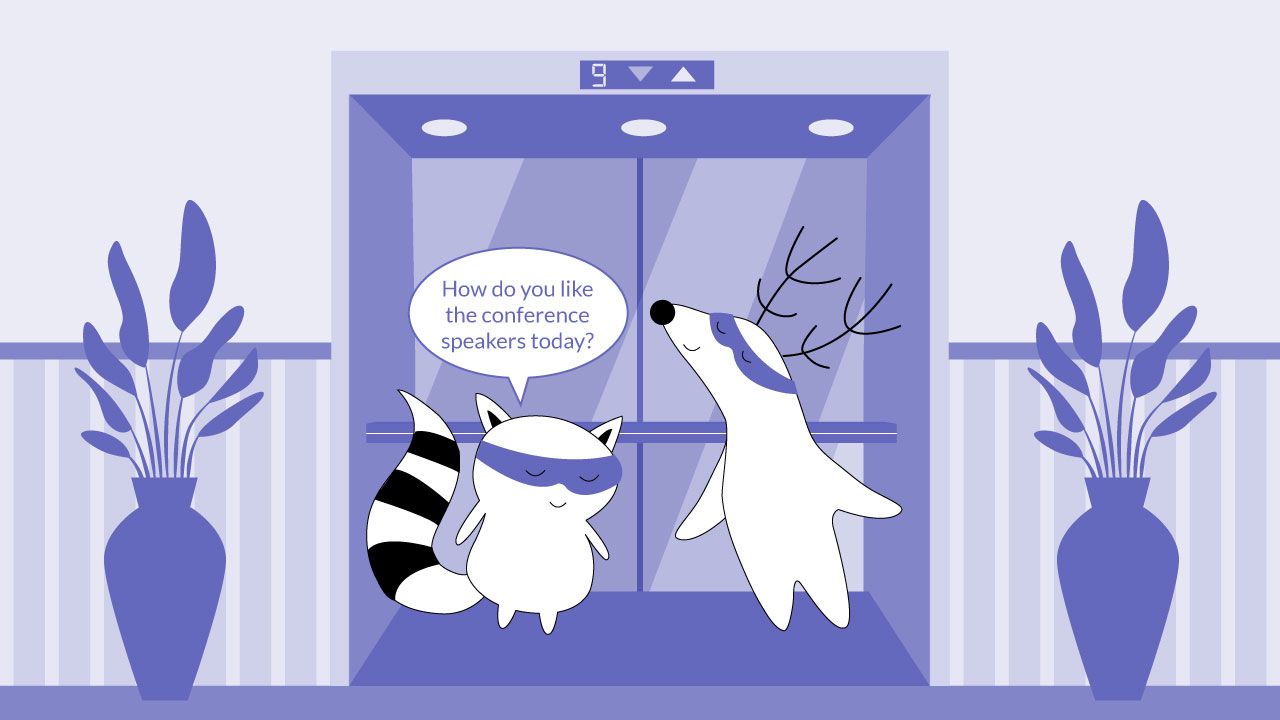
Phrases to Express Your Opinion
Once you have the person’s attention, it is important to be able to keep the conversation going. Most likely, your new acquaintance will ask a question or will be interested in your point of view on a topic. To answer them, you need to know how to express your opinion in a polite manner.
Here are several phases suitable for both formal and casual conversation:
- In my opinion… / In my experience…
- The way I see it… / From my point of view…
- It seems to me that… / To my mind… / What I mean is…
- As far as I’m concerned…
- To tell the truth… / Frankly speaking…
- If you ask me… / Personally, I think… /Speaking for myself…
- I’d say that… / I’d suggest that… / I’d like to point out that…
- I believe that… / I guess that…
- My opinion is that… / I hold the opinion that…
- It goes without saying that…
At an official event, try to formulate your thoughts more carefully and less emotionally than when communicating with friends. For example:
- It is thought that… / It is considered…
- Some people say that…
- It is generally accepted that…
Phrases to Express Agreement or Disagreement
First of all, let’s figure out how you can agree with someone in English. All the phrases listed below are appropriate in both formal and informal settings. They are neutral: if you are at a business event or a meeting, say them in a calm tone, and at a party with friends, you can get a little bit emotional.
Choose a phrase to agree with the person in a proper way:
- I agree with you entirely. / I totally agree with you. / I agree with you one hundred percent. / I couldn’t agree more.
- You’re absolutely right.
- Absolutely. / Exactly. / No doubt about it.
- I suppose so. / I guess so.
- I was just going to say that. / This is exactly what I think.
- I am of the same opinion.
When you want to express disagreement in a professional context, you need to be very polite to avoid offending the other person, especially if you have just met them or are at an official event. We recommend using the following expressions of disagreement in a formal English conversation:
- I’m afraid I have to disagree. / I beg to differ. / That’s not really how I see it, I’m afraid. / I’m sorry to disagree with you, but…
- Yes, but don’t you think… / I agree to some extent but… / On the whole, I agree with you but… / True enough but…
- Not necessarily. / On the contrary… / The problem is that… / I doubt whether…
- No, I am not so sure about that. / No, I disagree. What about… / I am of a different opinion because…
- With all due respect…
- I see what you mean but have you thought about… / I hear what you are saying but… / I see your point but…
How to (Politely) Interrupt a Person Speaking
Interrupting someone without offending them is a real skill. Of course, it is important to note that you should not interrupt the speaker and wait until they are finished to express your opinion.
However, if it’s necessary to intervene in the conversation, make sure to say «Excuse me!» first and then use one of the following examples:
- Excuse me for interrupting, but… / I apologize for interrupting… / Sorry to interrupt, but…
- Can I add/say something here? / If I might add something… / Can I just mention something?
- Do you mind if I come in here? / Before you move on, I’d like to say something.
After you have expressed your opinion, do not forget to pass the word back to the person. To do this, you can say:
- Sorry, go ahead. / Sorry, you were saying…
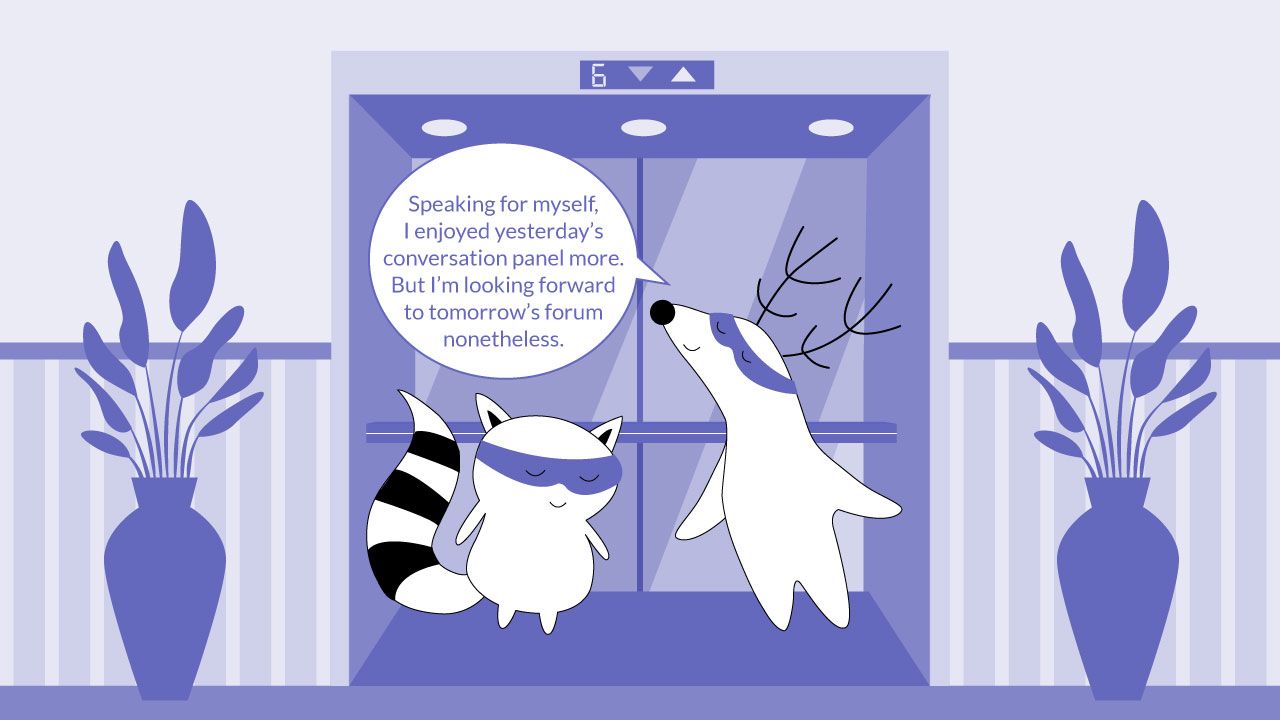
How to Say Goodbye Formally
After the conversation, you need to say goodbye to your new acquaintance. Of course, the standard «Goodbye!» is suitable for almost any given setting. However, you can say goodbye with other phrases as well. Here is a list of expressions for ending a formal conversation in English:
- Have a good day/good night!
- I look forward to our next meeting.
- It was nice to see/meet you.
Additional Tips
As you already know, the formal style is used in an official setting — when communicating at conferences and presentations, conducting business negotiations, writing documents, corporate emails, scientific articles.
You should follow several rules to make the speech sound formal:
Avoid Using Contractions
In formal writing, there is no place for contractions like I’m, I’d, I don’t. Instead, use the complete forms of the words: I am, I would, I do not. Moreover, the use of contractions is one of the primary reasons for the most common misspellings — for example, confusing «their» and «they’re.»
Misspellings can hurt the initial meaning of a sentence and make you look unprofessional. For example, let’s take a closer look at the go-to phrase «duly noted,» which means that something is recorded appropriately or taken into proper consideration. Its common misspellings include «dually noted,» «dully noted,» and «duelly noted.»
«Dually» means a double capacity, while «dully» means something is done in a boring manner. When spelled correctly, you can use «duly noted» in a formal speech in the meaning of simple acknowledgment of an opinion or action. That’s why you also don’t want to confuse «duly» with «dully,» letting someone know you barely consider what they’re saying.
Moreover, «duly noted» can also be used sarcastically, meaning that something is heard and ignored rather than taken into appropriate consideration. It’s not necessarily a rude phrase, but you should pay close attention to the context in which you use the phrase «duly noted.»

Avoid Using Slang and Phrasal Verbs
When holding a formal conversation, there are a few things you should avoid to make it sound appropriate. Some of these things include:
- Avoiding slang and colloquial expressions. This point is pretty obvious: it is difficult to imagine a business partner who calls you «bro.»If you want to ask how the representative of the partner company is doing, it is unlikely that you will say, «What’s up?» And in response, you will not receive the colloquial «Yourself?» but a polite «Thank you, very well.»
- Avoiding phrasal verbs. Phrasal verbs should be replaced by regular ones. For example, in an official setting, you are unlikely to hear «the inflation rate went up.» Instead, it would be better to say «the inflation rate increased.» In addition, avoiding phrasal verbs reduces your chances of making mistakes because they can be very confusing for non-native speakers.
Use the Passive Voice
The formal English language uses not only long phrases but also complex grammatical constructions. If you have started to express an idea, make sure to develop it, support it with clear arguments, justify it and bring it to a conclusion.
In addition, formal emails and oral speech allow you to use the passive voice much more often than in casual conversation, as it is more suitable for an official setting. The reason is that the active voice personifies speech, while the passive voice has a more formal connotation, compare:
- You are invited to the conference.
- We invite you to the conference.
As you can see, the first option sounds more discreet and respectful. If you want to speak formally, do not forget to use complex sentence structures (for example, independent clause + at least one adverbial phrase), participial phrases, conditional sentences, etc.
Use Special Terminology
Each industry has its own specifics, so try to use the appropriate jargon or vocabulary. For example, if you work for an accounting firm and check the financial statements of a business, it would be appropriate to say «audit» instead of «check.»
Try to use the specific industry-related words in an official setting and business correspondence — your English speaking skills will not only benefit from this, the person you’re speaking to will also be pleasantly surprised.
Avoid Speaking for Yourself
If you are writing a business letter or conducting business negotiations, try to avoid expressions such as «I think» and «in my opinion.» As a rule, you should speak on behalf of the company you work for — talk less about yourself, your personal opinion, and contact business partners as a representative of the company.
Here are the example sentences:
- We are pleased to receive your offer. Can we discuss this in further detail?
- It’s a contribution duly noted by the board of directors, and we are looking forward to taking our partnership to the next level.
- If you need any additional information, do not hesitate to contact us.
Be Discreet and Inclusive
Last but not least. Formal speech is an example of ethical, respectful, and inclusive communication. Choose your words carefully to avoid offending the people you’re addressing. To write and speak inclusively, make sure to follow these principles:
- Use gender-neutral language and pronouns, such as the singular «they.»
- Avoid gendered group language, such as «you guys.»
- Avoid stereotyping and making neither positive nor negative generalizations.
- Avoid making assumptions regarding anyone’s sexuality or relationship status.
- Avoid outdated language.
- If you’re not sure about something, ask!
The Bottom Line
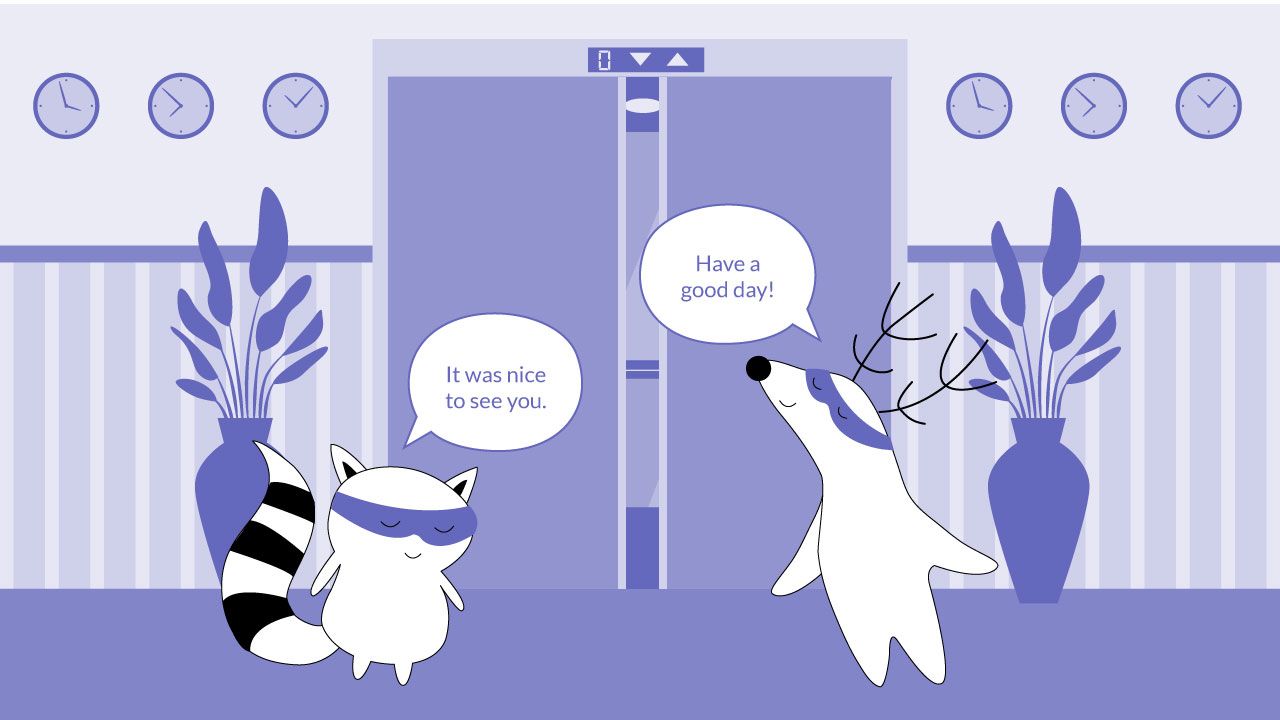
As you can see, to maintain a formal conversation in the English language, you need to learn some common phrases that will help you start a conversation and you’ll need to be careful with your choice of words. Fortunately, you don’t have to memorize all the examples mentioned in this article — you can revisit it as frequently as you need to.
Furthermore, with practice, you will learn a lot of additional expressions from native English speakers and boost your English vocabulary.
If you’re interested in expanding your vocabulary and picking proper phrasing, you can download our Langster app. It is full of bite-sized stories with grammar explanations for each, which will allow you to enjoy your English learning experience even more. See for yourself:
Learn English with Langster
A speech is either formal or informal. Meaning, it can either be a formal address delivered to an audience or the daily use of grammar and words to communicate. The only purpose of either of those speeches is to put across a message well enough to invoke the desired response from your audience. Throughout history, humans all across the world cleverly inspired world-wide revolutions solely through the power of speech. Since then, a lot of tools and techniques of speeches have developed to ensure we use this power to its maximum capacity.
The two broad classifications of events we use speeches are called formal events and informal events. Therefore, depending on the kind of audience, the situation, the message, the tone and the environment, the orator must decide whether they should address a formal speech or an informal speech. Working out where you use what kind of speech is the most important aspect of being a good communicator.
Formal Speeches
What are Formal Speeches?
Formal Speeches are made when you’re speaking to a sizable audience you don’t personally know. These are professional events where you’re expected to make a good impression on the audience. The nature of these events is often serious and decorous. These events therefore demand a similar respectable tone of language and speech.
For example, while at a job interview, speaking to an individual of authority, delivering a lecture, making a presentation, giving a pitch, motivating the audience, hosting a business event etc., you must ensure you speak formally.
What makes a speech formal?
Formal speeches are also called orations. They are used in situations that are more ‘serious.’ They project a specific tone and specific characteristics. A few basic tools and attributes of formal speeches are:
Politeness
The tone of a formal speech is always polite and respectful. Since formal speeches are mainly used to communicate with people in authority or strangers, it is important to structure your sentences suitably. The use of civilised words, appropriate grammar, complete sentences and enhanced vocabulary maintains the decorum of a formal speech.
Objectiveness
A formal communication style usually takes no stances. The sentence is spoken in a passive voice with a minimum use of personal pronouns. When we avoid using personal pronouns such as ‘I’, ‘We’ and ‘You’, the essence of the point changes from being an opinion to a fact. Therefore, the content of your speech sounds more objective than subjective.
Effectiveness
A formal speech is more effective than an informal speech because it comprises longer sentences and clear, non-colloquial phrases. It is well-spoken and the pronunciations are fathomable and precise. Its adherence to the Standard English language makes it comprehensible for the entire audience, even the non-native English speakers. It therefore proves to be extremely effective, suitable for a workplace or a business environment.
Standard English Language
A formal speech naturally follows the standards and rules formally set by the language. Languages tend to have regional differences and additional local slang to them. Even within England, British English and Scottish English tend to have different dialects and colloquial. For example, maybe phrases like “sure-fire” or “works like a charm” are deemed normal at your workplace but you cannot expect a non-English speaking trader to know them. When we adhere to the Standard English prescribed by Oxford, everybody who has academically learnt the English language is able to understand what one is trying to say.
Clarity
The generous use of long sentences, no contractions, minimum abbreviations, proper grammar, complex sentence structure, clear pronunciation and overall objectiveness of the information brings a lot of clarity to one’s speech. There is seldom any room for doubts or misunderstandings. The extensive use of impersonal and formal language brings out professionalism and makes your information more credible.
What should you NOT include in a Formal Speech
The obvious ways of distinguishing between a formal speech and an informal speech are determined through the process of elimination. The following are a few things that you shouldn’t include in a formal speech:
Casual Greeting
There are a number of ways you can greet a person. Each kind of greeting has formal and informal versions that you can use based on how well you know the person and what degree of professionalism you are required to maintain with that person. For example,
- Formal: Hello, how do you do?
- Informal: Hey, how are ya?
- Formal: Nice to meet you/ Pleased to meet you.
- Informal: Good to see you.
- Formal: How have you been?
- Informal: Long time no see!
Slangs and Colloquialism
Slangs include a language that’s peculiar to a particular group, a regional reference, or even curse words. It’s extremely important to keep slang words at bay when you’re delivering a formal speech. A formal tone prescribes standard, professional English language. For example,
- Informal: Stats say, stress is the reason why this workplace is always screwing up.
- Formal: According to statistics, stress is one of the most frequent factors that disrupts efficiency and encourages problems in the workplace.
- Informal: Know yourself honestly and well enough to find what stresses you out.
- Formal: Being candid with ourselves is the most effective way to establish the triggers of stress we experience.
Contractions
Contracting words and sentences assert an informal and casual tone. If you are aiming to sound professional and polished, avoiding contractions is recommended. For example,
- Informal: I’ve had enough, I don’t think I’m gonna let this slide the next time.
- Formal: Your limit has been surpassed, I do not think this mistake will go unpunished the next time.
Personal Pronouns
The main characteristics of a formal speech are its impersonal nature and the precise, passive and objective delivery of information. While writing a formal speech, avoid using pronouns altogether. However, if required, try using neutral pronouns such as ‘one.’ For example,
- Informal: I was alarmed when I found out the effects of stress.
- Formal: The effects of stress were found to be quite alarming.
- Informal: You shouldn’t stress out about the things you can’t control.
- Formal: One shouldn’t take stress about the things beyond one’s control.
Poor Vocabulary
Gather your thesaurus before you write your formal speech because the better your vocabulary, more formal the content of your speech sounds. While both your sentences would mean the same thing, the tone in which they are delivered would classify them as informal speeches or formal speeches. For example,
- Informal: He took the item back to the shop.
- Formal: He returned the item to the shop.
- Informal: The CEO of this company gave up his position because his mental health was being affected.
- Formal: The CEO of this company relinquished his position due to his mental health being compromised.
How should you structure a Formal Speech?
The basic structure of a formal speech is no different than the structure of an essay. Organising your speech not only improves the clarity of thought but also amplifies the effectiveness of your content. A formal speech includes an introduction, a body and a conclusion.
The Introduction
A formal introduction establishes a respectful contact between the speaker and the listener. The introduction should last for one minute at the most. It should sound deferential and strictly adhere to formal English. How should you begin a formal speech?
The Greeting
The introduction of a formal speech can typically begin with a greeting. After wishing ‘good morning’ or ‘good evening’ depending on the time of the day, you may introduce yourself humbly. You can thank the organisers of the event for inviting you to speak or compliment a senior member of the event to pay respect.
Acknowledging the Audience
It is polite to thank the audience for gathering to hear you out. Greet them with a genuine smile and express what an honour it is to be speaking before them today. After all, they have sacrificed their precious time to be here today.
Placing your Claim
The introduction is the most crucial segment of your speech. The curiosity you are able to pique in this part decides how much audience you will retain throughout your speech. It is extremely important you place your claim in the most catchy manner. Even in a formal speech, you can use quotes, rhetorical devices, imagery, startling elements, stories or even silence. As long as the language used is respectful, professional and follows the formal English, it can be a good opener for a formal speech.
In case you’re looking for a few creative ways you can open your speech, you can refer to our blogpost for help!
The Body
The body makes up everything you have to say about the claim you placed in the introduction. It can have additional facts, supporting arguments and other temporal modes of organising your information. The temporal modes of organising information can be:
- Cause-effect relation in past, present or future tense
- Effect-cause relation which is basically inverting it and highlighting the effects before you state how they are achieved.
- Compare and contrast your entities.
- Narrate your topics as a story by organising the flow of the speech by finding relation and joint-relevance between two topics.
- Subdividing a large chunk of information into headings and subheadings is also a good topical way to organise your information formally.
The Conclusion
How do you end a formal speech? The conclusion follows the transition that was laid down by the body. The two main aims of a conclusion are to summarise the ideas of the speech and provide a closure. The conclusion of any formal speech can include:
- A summary of the speech.
- A ‘Now-What?’ statement elucidating the takeaway of the speech for the audience.
- A quote.
- A reference back to the introduction of the speech.
- An open-ended question to ponder upon.
If the last line of your speech is as important as the introduction segment where you make the claim. The weight and impact of the last sentence decides how memorable your speech would be. If you don’t feel like dropping the mic after the last sentence of your speech, maybe it’s not as mind-blowing and impactful as it ideally should be.
If you are looking to seek more advice on how you can structure your formal speeches more professionally, be sure to check out our guidelines.
Informal Speeches
Informal speeches are casual and relaxed. They are made while talking to friends, colleagues or people you personally know. There are no hard and fast rules while making an informal speech other than somehow conveying the message you want to convey.
What makes a speech informal?
Informal speeches radiate a very comfortable and relaxed energy. They’re friendlier than formal speeches and they often carry the personality of the person addressing them. A few characteristics that can help you identify informal speeches are:
Easygoing
Since casual speeches don’t require a very strict preparation like formal speeches, they are often easygoing. Informal speeches are made sporadically and are mostly off the record. The level of ease informal speeches carry can differ from person to person given how extroverted they are, or how comfortable they are with the audience.
Colourful
Informal speeches sound colourful. In the sense, the speaker is given the liberty to express themselves as they truly are. They don’t have a monotonous tone like formal speeches. The speaker can add their own slang, phrases they normally use, their personality, their dialects and in general make the speech as entertaining and fun as they please.
Humourous
Informal speeches give you the artistic and comedic liberty to put forth your message. While formal speeches usually adhere to the strictness of sounding ‘serious’ and ‘professional’, informal speeches are like laid back and pleasurable conversations.
Simple
You do not normally talk in complex sentence structures or dramatically use vocabulary. Likewise, informal speeches are often simple and straightforward. They use short sentences and terms and references from day-to-day life. You may use words and phrases like ‘that’s dope’, ‘don’t be salty’, ‘bruh’, ‘I’m shook’, ‘No cap’ etc.
Friendly
Informal speech is used in day-to-day life. Unlike other languages, most English speakers tend to speak informally with strangers on the street. While they’re friendly, they might not necessarily be polite if the listener cannot interpret the tone of your speech.
Since informal speeches are more often used in everyday life, they don’t really have a structure. They do not require an introduction, a body or a conclusion. Apart from the unspoken rules of exchanging pleasantries and courtesy, you do not need to ‘prepare’ anything formal, just have the idea of what you want to say in mind.
A few examples of informal speeches would be:
- A Best Man’s Speech for his Brother’s Wedding: In this example, the occasion is properly informal. The speaker is amongst friends and family, speaking about his brother and his new wife. It is hilarious and also contains a poem to deliver the message!
- A Valedictorian Speech for the Class of 2010: In this example, while the occasion is formal, the speaker has very cleverly added a subtle informal tone while still maintaining the collective polite structure. He framed all inside jokes in a way everybody could understand. It was overall confident, humorous, ingenious and a great valedictorian speech.
What are the Main Differences Between Formal and Informal Speeches?
The following table elucidates the main differences between formal and informal speeches, summarising all its characteristics.
| Formal Speech | Informal Speech |
| Its tone is serious. | Its tone is casual. |
| It sounds polite. | It sounds friendly. |
| When overused, it can come across as cold and distant. | When overused, it can come across as brash and rude. |
| The sentence structures are complex. | The sentence structures are simple. |
| An extensive range of vocabulary is used. | Simple words and general vocabulary is used. |
| Pronouns are either avoided or neutralised. For e.g. ‘one’. | Personal pronouns are used expansively. |
| Slang and colloquial language is not used. | Slang and colloquial language can be used. |
| The content shared is impersonal and objective. | The content shared expresses one’s personality and is often subjective. |
| Abides by the rules of standard English. | Need not strictly adhere to the rules of standard English. |
| Follow an introduction-body-conclusion structure. | Need not follow any concrete structure. |
Case Study: A Sales Pitch
Let’s study the an applied example of formal and informal speeches. The above video is a sales pitch for electric cars. There are two characters in this video, each used in informal speech and formal speech respectively. Let us analyse both their speeches to understand how you can implement the two styles in your communication.
Informal Speech
The first man uses an informal style of speech. He begins his speech by saying, “Ladies and gentlemen, electric cars. They’re totally gay.” Naturally, in a work environment where formal tones are expected, the opening statement left all the members of the meeting stupefied. They found his speech disrespectful and all the faces around the room were either shocked, perplexed or disapproving. The casual tone could have easily been found offensive on the pretext of homophobia. He also says things like ‘rock-and-roll-ness’, ‘sexiness of the car’, ‘this model took more virginities than Francis Albert Sinatra’, which can come across as rather controversial in a formal business meeting. Gradually, the informal and blunt approach did work out for the salesperson. However, the chances of it being successful are bleak and you could just be overruled any time. Using a formal tone is therefore a safer option.
Formal Speech
The second man in the film, referred to as Nicholas, takes over and summarises the pitch using formal speech. He uses statements like, ‘We believe we can produce the technology to incorporate an electric motor in your current model.’ He said the exact same thing the first man was trying to communicate but in a far more classy manner. Instead of calling it ‘sexy’ or ‘rock-and-roll’, he refers to its features as ‘exhilarating’ and ‘aggressive’, making the experience ‘visceral’ and retaining a manly retro element of the car than making it look ‘gay’.
This example distinguishing formal speech with informal speech hopefully gives you a thorough idea of what they are. However, when should you use formal speech? And when should you give an informal speech?
Should you use Formal Speech or Informal Speech?
Knowing what speech is best suited for the given situation always depends on the context. You should be intelligent enough to be able to recognize situations that demand a formal tone and situations that can be handled casually.
Generally, informal speeches are made at weddings while giving a toast or at birthdays to express love etc. Formal speeches are made in professional settings, work places, educational institutes, talking to authorities, job interviews, business meetings, negotiations, elders or people you don’t know.
However, sometimes in job interviews, the interviewer can be looking for what your personality is like. In situations like this, you need to tone down how formally you talk. Some corporate cultures embrace a casual and informal tone in their business affairs while some companies prefer individuals who can maintain a strong formal and professional persona.
When you are doubtful about what speech to use, always stick to formal speech. While informal speech is friendly, formal speech is polite. It establishes goodwill and credibility. Although it’s not good to be overly formal either. Saying “Greetings, let me guide you through the floorplans of this building so you can navigate the office easily.” is frankly absurd and foolish. Being too formal can also come across as cold, distant and ironically even impolite. You do not want to be a robot. Sometimes saying, “Good morning, allow me to give you an office tour.” does just the right thing.
To Conclude,
A good communicator can not only convey any kind of message to their audience but also convey their message to any kind of audience. And in order to achieve this, a good communicator is the master of the art of speech as well as the master of knowing the audience and what tone they would appreciate.
This entry is about differences in vocabulary of formal and informal styles. For general differences, see this article.
Both formal and informal vocabulary can be found in all spheres of the language. As the language becomes more liberal, combining these two groups of words gets more common. Below is an example list of words and expressions in formal and informal registers.
What does ‘formal’ mean? Simply put, it means something or someone following established norms, traditions and habits. A formal letter should have certain structure and vocabulary, usually more official and strict. Think of formal as a rough synonym for ‘official’.
Vocabulary for letters
| Informal | Formal |
| To ask for help | To request assistance |
| To tell, to let know | To inform, to notify |
| Problem | Issue |
| Speak to | Address smb. |
| Talk about | Discuss, consider |
| Fix, take care of, put right | Rectify, amend |
| I think that … | I believe/hold it that … |
| I want to … | I wish to … |
| I’m ready to … | I am willing to … |
| I’m angry about … | I am dissatisfied with … |
| Deal with, take care of | Manage, resolve, settle |
| Put up with | Tolerate, bear, endure |
| Bring up | Mention |
| Take away | Remove |
| Thanks | I am grateful/thankful for … |
| I’m sorry about … | I regret about … |
| I’m writing about | I am writing regarding |
| I’ll get in touch … | I will contact … |
| If you have any questions | Should you have any questions |
General formal and informal vocabulary
| Informal | Formal |
| And | As well as … |
| But | Whereas/While |
| So, in this manner | Thus |
| If … | Should … /Whether … |
| If … or not | Whether … or not |
| For sure | Definitely/Assuredly/Certainly |
| Many | Numerous/Several |
| Get | Receive |
| Keep | Retain |
It is recommended to stick to either formal or informal words whenever possible. In other words, don’t mix two registers. It is as important as consistency in using English and American spelling. However, using two registers in your speech is not a serious error. At least as far as your speech is concerned. You should nevertheless pay attention to your writing — if you can use a less colloquial expression in your formal letter then you should do so. Sometimes mixing can’t be helped — for example, using phrasal verbs in a text. Phrasal verbs give life to your writing, so you shouldn’t abstain from using them. But such things as contracted forms or slang words — they do not belong in a formal text. Some dictionaries have detailed entries on formal and informal register.
Which register should I use?
The degree of formality is usually decided by the following factors:
- How well you know the person you’re writing to — the better you know the person, the less formal your writing will be (within reasonable limits)
- The purpose of your letter — business correspondence tends to be more formal
- The relative position of the person you’re writing to — a letter to your boss will be strictly formal. A letter to your subordinate is more likely to be semi-formal or fairly informal.
Use your judgement and common sense to decide on the register. For example, a letter to your boss who is much older than you, but whom you know very well is likely to be semi-formal, despite of his age and position. Conversely, if you are the head of department writing to a junior staff member whom you do not know, your letter should be on the formal side.
Conclusion
Bottom line is: if you are unsure whether to use formal or informal words, then stick to more respectable and tactful formal vocabulary. Nobody is going to hate you for being too formal. You will get a funny look or two if you overshoot with formality, but that is definitely not the end of the world!
On the other hand, opting for informal style and vocabulary in certain situations may be tactless and even rude. This in mind, use this simple rule:
When in doubt, keep it formal!
We use cookies on our website to give you the most relevant experience by remembering your preferences and repeat visits. By clicking “Accept”, you consent to the use of ALL the cookies.
Every English learner needs to learn Formal and Informal words and the situations these words are suitable to use in. We have compiled a huge list of formal and informal words that can help learners differentiate easily.
First thing first, let’s try understand what is a formal and informal word. Formal words are used in official communication in both oral or written. You are a student and you definitely talk to your teachers, your teachers would appreciate if you communicate formally with them. The same is the matter with a boss or anybody in the world with whom you are not frank enough. Let’s take a few examples
you want to write a letter to your teacher to explain why were you absent last day. You have two words ‘away’ and ‘absent’ , in formal situations we definitely have to choose absent but yes if you are talking to your classmate, you can tell him why were you away last day.
Informal words shouldn’t be used with your teachers, boss and the people you are not frank with. You can comfortably use these words with everybody you are frank with, in short.
Avoid———–Evade
Also In ————Addition,
Ask –————––Enquire
Afraid-———— Fearful
At First————- Initially
Ask For————- Request
Again & Again ————-Repeatedly
A Bit ————-A Little
Avoid————- Evade
Anyway ————-Nevertheless
Ask Out————- Invite
Away ————-Absent
At Once ————-Immediately
A Lot Of ————-Numerous
Bright/smart————- Intelligent
Buy ————-Purchase
Build ————-Construct
But ————-However,
Bad ————-Negative
Beat up————- Assault
Break out ————-Erupt
Block ————-Undermine
Blow up————- Explode
Boss ————-Employer
Brave————- Courageous
Better————- Improved
Big/Large————- Enormous
Bring in————- Introduce
Break off ————-Suspend/adjourn
Break down————- Fail/Collapse
Check ————-Verify
Come after ————-Follow
Choose————- Select
Clear ————-Transparent
Come in ————-Enter
Call off –————Cancel
Complex ————-Convoluted
Call on–———— Visit
Childish ————-Infantile
Chance————- Opportunity
Cheap ————-Inexpensive
Can Is ————-capable of
Come up ————-to Reach/attain
Climb–———— Ascend
Clothes ————-Garment
Dirty/ polluted ————-Contaminated
Danger ————-Peril
Dare ————-Challenge
Dad ————-Father
Describe————- Depict
Deal with————- Handle
Dim ————-Indistinct
Death————- Demise
Deal ————-with Manage
Drop out ————-of Withdraw (from)
End ————-Terminate/ Finish
Ease –————Facilitate
Eager————- Avid
Expect ————-Anticipate
Enough ————-Sufficient
Explain ————-Disclose
End ————-Terminate
Empty ————-Vacant
Enjoyment ————-Gratification
Friendly ————-Amiable
Free ————-Liberate
Fork out ————-Pay (money)
Fall out————- Quarrel
Fight ————-Combat
Get ————-Receive
Get out ————-Escape
Go ————-Depart
Go before————- Precede
Go after –————Pursue
Good looking ————-Attractive
Give————- Donate
Go down ————-Decrease
Go through————- Examine
Good for————- Beneficial
Go ahead ————-Proceed
Go up ————-Increase
Go on ————-Continue
Go out of ————-Exit
Give up————- Quit
Get away————- Elude
Go away————- Leave/ depart
Give out————- Distribute
Go against–———— Oppose
Get ————-Obtain
Good ————-Positive
Get by————- Survive
Hit out at ————-Criticise
Hungry————- Famished
Here ————-Present
Help————- Assist
Hopeless————- Futile
Happy ————-Pleased
Hurry –————Haste, hasten
Hurt ————-Damage
Idea ————-Notion
Imagine–———— Envisage
In charge of–———— Responsible
Iron out ————-Solve/overcome
Job ————-Occupation
Keep————- Preserve
Kidding ————-Jesting
Kids ————-Children
Look up to————- Respect
Look at————- Regard
Lucky ————-Fortunate
Lead to————- Cause
Let ————-Allow
Lucky————- Fortunate
Lack ————-Deficiency
Look for ————-Seek
Let ————-Permit
Live————- Reside
Leave out –———––Omit
Look like————- Resemble
Lively ————-Energetic
Laid back–———— Relaxed
Live ————-Reside
Look into————- Investigate
Make up————- Fabricate
Mainly————- Principally
Mad ————-Insane
Maybe ————-Perhaps
Mend ————–Repair
Marvelous————- Exceptional
Need ————-Require
Naked ————-Nude
Next/later ————-Subsequently
Old ————-Elderly
Over At an ————-end
Okay, ok————- Acceptable
Older————- Senior
Put off ————-Postpone
Pay back————- Repay
Put/ set down————- Deposit
Pin down————- Determine
Put in ————-Insert
Pick up ————-Collect
Put up with ————-Tolerate
Point out ————-Indicate
Really big————- Considerable
Remove ————-Eliminate
Rack up————- Accumulate
Refer to ————-Consult
Rich ————-Wealthy
Round ————-Circular
Right ————-Correct
Show ————-Demonstrate
Speed up ————-Accelerate
Stop ————-Cease
Set up ————-Establish
Sick————- ill
Stubborn ————-Obstinate
Start/ Begin ————–Commence
Shorten ————-Decrease
Settle for ————-Choose
Say no————- Reject
Small————- Diminutive
See————- Observe
So————- Therefore
Sight————- Vision
Seem ————-Appear
Set out –————Display
Seem ————-Appear
Sweat ————-Perspiration
Say sorry————- Apologise
Say ————-Express
Talk into ————-Persuade
Tired–———— Exhausted/ Fatigued
Throw away ————-Discard
Take out————- Remove
Test ————-Experiment
Thanks ————-Gratitude
Tough ————-Difficult
Try out ————-Test
Talk about ————-Discuss/consider
Throw ————out Eject
Think of ————- Conceive
Try ————-Endeavour
Think about————- Consider
Tell ————-Inform
Use ————-Utilize
Wood ————-Timber
Want/ hope————- Desire
Wrong————- Incorrect
Wait for ————-Await
Want ————-Desire
Worse ————-Inferior
Whole————- Entire/Complete
Young–———— Youthful
GET PDF
Difference Between Formal and Informal WordsFormal and Informal Words in WritingFormal and Informal Words PDFInformal To Formal ConverterInformal Words DictionaryInformal Words MeaningList of Formal Words for Academic WritingList of Formal Words for Academic Writing Pdf








